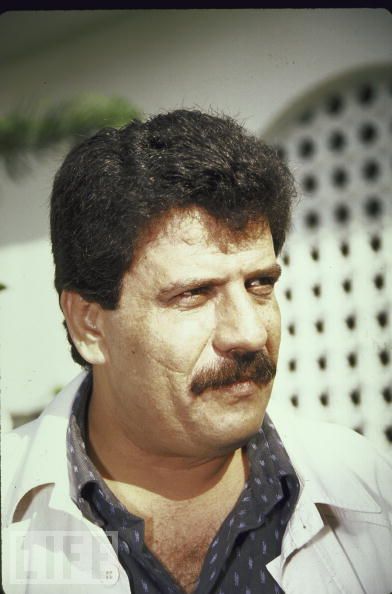<Back to Index>
- Mathematician Augusta Ada King, Countess of Lovelace, 1815
- Poet Nikolay Alexeyevich Nekrasov, 1821
- Founder of the Palestine Liberation Front Muhammad Zaydan (Abū Abbās), 1948
PAGE SPONSOR


Muhammad Zaydan (December 10, 1948 - March 8, 2004) also known as Abū ‘Abbās (ابو عباس) or Muhammad ‘Abbās, was the founder and leader of paramilitary group the Palestine Liberation Front (P.L.F.).
Zaidan was born in Safed, Israel. Zaydan joined the radical, pro-Syrian Popular Front for the Liberation of Palestine - General Command under Ahmed Jibril in 1968. In 1977, major disagreements arose between the P.F.L.P. - G.C., the P.L.O., and other Palestinian factions based in Lebanon. Zaidan, who opposed Syrian involvement in the Lebanese war, left the P.F.L.P. and created the P.L.F. with Talaat Yaacoub, which eventually split into three separate factions (and then later re-merged). Zaydan's faction of the P.L.F., which was the largest of the three, moved its headquarters to Tunisia.
Since
its inception in 1977, the Abbas-led P.L.F. was a member of the Palestine
Liberation Organization and
received support from both the P.L.O. and Yasser Arafat's Fatah movement.
Unlike the P.F.L.P. - G.C., the PLF has supported peace negotiations
between Israel and the Palestinians. Zaidan was elected to the
Executive Committee of the PLO in 1984 and represented the Palestinian
National Council (P.N.C.) in 1989 during peace negotiations with Israel.
Although Zaidan was wanted by Israel for his involvement in guerrilla
attacks against Israel (including terrorist attacks on civilians)
throughout the 1970s, 1980s and 1990s, Israel allowed him to travel
freely in the Gaza Strip
throughout the 1990s because he supported the peace negotiations. One
notable
terror attack masterminded by Zaidan resulted in the violent deaths of
Danny Haran (age 28) and his two daughters, Einat (4) and Yael (2) in
April 1979 in their Nahariya,
Israel home by Samir Kuntar. Throughout
the 1980s, the P.L.F. launched attacks on both civilian and military targets in the north of Israel,
across the Lebanese border. In 1985 he masterminded the hijacking of the Italian cruise ship the Achille Lauro.
During the hijacking, 69 year old wheelchair - using American Jewish passenger Leon Klinghoffer,
was shot dead and thrown overboard. The four hijackers, fearful of United States military
intervention, surrendered to Egypt in return for safe passage out of
Egypt, based on the pretext that they had done no harm to any of the
passengers. United States
Special Operations Command intercepted
the plane carrying the hijackers to Tunisia and redirected it to Sigonella, a
NATO base in Italy. There they discovered that Zaidan and PLO political
officer Hassan were also on the plane. Due to insider deals within the
Italian government, they were both flown from Sigonella to Fuciamo airport (An auxiliary field
next tor Rome's main international airport, Leonardo da
Vinci Airport). From there, dressed in Italian air force
officers' flight suits, they boarded a Yugoslav civilian airliner
destined to Belgrade,
Yugoslavia.
Despite American requests for the extradition of Zaidan
from Yugoslavia, he was not extradited due to Yugoslav relations with
the PLO. He
then flew to Aden, South Yemen, and from there to Baghdad where Saddam Hussein sheltered him from extradition to Italy. He remained in Iraq and commanded the P.L.F.
(reunited in 1989) until Saddam was deposed by coalition forces in 2003. Italy (whose government had previously let Abu
Abbas leave the country without being arrested) sentenced Zaidan in absentia to five terms of life imprisonment for
his role in the Achille Lauro hijacking. He was also wanted in the U.S.
for crimes including terrorism, piracy, and
murder. In 1996, he made an
apology for the Achille Lauro hijacking
and murder of Leon Klinghoffer and advocated peace talks between
Palestinians and Israel; the apology was rejected by the U.S.
government and Klinghoffer's family, who insisted he be brought to
justice.
On April 15, 2003, Zaidan was captured by
American forces in Iraq while attempting to flee from Baghdad to Syria. Italy subsequently requested his
extradition. The Pentagon reported on March 9, 2004 that Zaidan had
died the previous day, of natural
causes,
while in U.S. custody. The P.L.F. accused the Americans of
assassinating their leader. The U.S. authorities agreed to give Abbas'
body to the
Palestinian Red Crescent for burial in Ramallah on the West
Bank. However, his burial
there was blocked by the Israeli authorities, and he was buried in the
Martyrs' Cemetery in Damascus instead.
